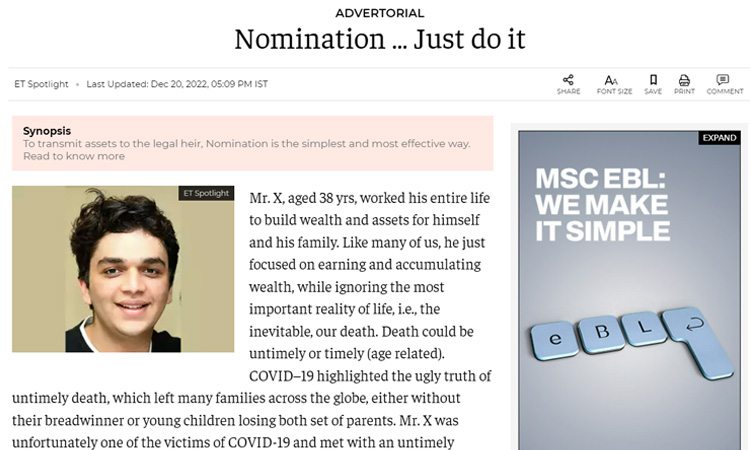Blog
Nomination … Just do it

Mr. X, aged 38 yrs, worked his entire life to build wealth and assets for himself and his family. Like many of us, he just focused on earning and accumulating wealth, while ignoring the most important reality of life, i.e., the inevitable, our death. Death could be untimely or timely (age related). COVID–19 highlighted the ugly truth of untimely death, which left many families across the globe, either without their breadwinner or young children losing both set of parents. Mr. X was unfortunately one of the victims of COVID-19 and met with an untimely death, leaving behind his homemaker wife and two children, aged 7 and 10 years. The grieving family found it difficult to come to terms with the loss, but had to face another daunting task of ensuring all the assets in his name were transmitted to that of his spouse. They realised Mr. X had failed to register his wife as a nominee in most of his assets, nor had he prepared a will. Due to this, his assets including his bank account were frozen for any transaction, leaving the family in a dire state. They were at the mercy of their relatives to survive until access to his frozen bank accounts and assets were provided, for which his spouse applied for a succession certificate that, in turn, takes up to 2-3 years to come.
This makes us wonder about the benefits of owning such wealth or assets that is of no use to the family when they need it the most? Also, like providing resources for family, isn’t it the family heads’ moral responsibility to plan for a smooth transmission of assets in case of his demise?
Let us now understand the options available for smooth transmission of assets to the Legal Heir(s).
- Nomination
- Will
- Succession Certificate (in case a person dies inestate)
In this article, we shall focus on Nomination as an option for succession planning.
Nomination is the simplest and most effective way to transmit assets to the legal heir. It is in fact the first step to planning a smooth transmission. One can immediately, upon acquiring an asset, register a nominee in that asset. There is no cost involved in registering a nominee. One can register multiple nominees in an asset and can also define their share in that asset. In case the share is not defined, all nominees will get an equal share in that asset (Share clause may vary from organisation to organisation).
A nominee will either be the ultimate beneficiary or will be a trustee of that asset.
| Investment Option |
Status of Nominee |
| 1. Life Insurance |
Trustee |
| 2. Employees Provident Fund |
Beneficiary (only family member to be nominee) |
| 3. Bank Account & Fixed Deposit |
Trustee |
| 4. Shares & Securities |
Beneficiary |
| 5. Real Estate |
Trustee |
| 6. Mediclaim Policy |
Trustee |
Trustee vs Beneficiary
Trustee
A trustee is a person who coordinates and receives the money of the deceased. The deceased, during his lifetime, has to nominate this person to receive the proceeds upon his/her demise. The trustee does not have any right on this amount/asset. He merely acts as a guardian of this asset which belongs to the Legal Heir. It may be noted that the nominee/trustee can also be a legal heir/beneficiary in that asset.
Beneficiary
Beneficiary is a person who has absolute and exclusive right over the assets of the deceased. The deceased, during his lifetime, has to nominate this person to receive the proceeds upon his/her demise. Other legal heirs do not have any right over this asset.
Conclusion:
Various assets have different way of treating a Nominee. However, the underlying fact is that it is the most convenient and cost-effective way of transmission of assets to family member, immediately on the demise of the owner of assets. A nomination must be backed by a will.
Views are personal: The author - Raghavv S Roongta is associated with Roongta Securities Pvt. Ltd and is a founder of YouTube channel ‘cluelessabtfinance’